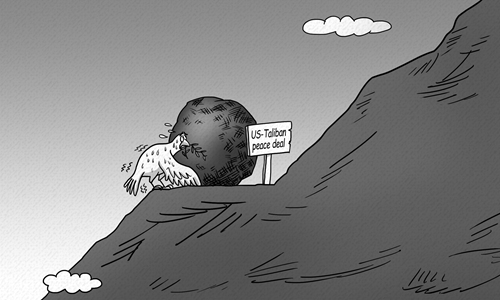HOME >> OPINION
Taliban peace deal ends US’ longest, most flawed war
By Zhao Minghao Source:Global Times Published: 2020/3/2 19:53:41

Illustration: Liu Rui/GT
The US has signed a peace deal with the Taliban, agreeing to withdraw US and NATO allies' troops from Afghanistan within 14 months. The war in Afghanistan, launched by the US in October 2001, has surpassed the Vietnam War as the longest war in US history. In addition to fighting a war, the US has been mired in a large-scale nation-building project in Afghanistan, costing around $133 billion.
During his tenure, then US president George W. Bush planned to transform Afghanistan into a democracy. He believed that "Afghanistan was the ultimate nation building mission" and that his country "had liberated the country from a primitive dictatorship, and we had a moral obligation to leave behind something better."
The "nation building mission" in Afghanistan was once seen as part of the US' grand strategy of "liberal hegemony." Washington sought to democratize the Middle East, including Iraq and many Central Asian countries.
But the harsh reality is, after nearly two decades of war, Afghanistan's political system and domestic stability remain fragile. It is one of the poorest countries in the world and faces great challenges in achieving long-term peace. As Javid Ahmad, a senior fellow at the Atlantic Council, put it, the US victory in overthrowing the Afghan Taliban regime was nothing more than a "catastrophic success," and the "version of the American dream for Afghanistan" is "untenable."
A number of US military elites believe that the US efforts in Afghanistan have been a failure. In December 2019, the Washington Post disclosed "a confidential trove of government documents" including unpublished notes from interviews with people directly involved in the Afghan war. The materials demonstrate the despair, frustration, and anger of insiders. Douglas Lute, a three-star Army general who once served in the George W. Bush and the Barack Obama administrations, said bluntly, "We were devoid of a fundamental understanding of Afghanistan - we didn't know what we were doing."
To a large extent, the efforts of US President Donald Trump's administration to end the war in Afghanistan are aimed at winning votes in the 2020 presidential election. The US people are extremely tired of this war. In August 2017, President Trump announced his new strategy in Afghanistan, saying that he shared "the American people's frustration over a foreign policy that has spent too much time, energy, money, and most importantly lives, trying to rebuild countries in our own image." He made it clear that "It is up to the people of Afghanistan to take ownership of their future, to govern their society, and to achieve an everlasting peace… We are not nation-building again."
The US was doomed to failure in Afghanistan, as it lacks consistent strategy in the Asian country with many policies contradicting each other.
The US-led "war on terrorism" aims to protect the safety of Americans and US allies rather than Afghans. Those operations have taken life of a great number of Afghans including women and children. This has intensified anti-US sentiment among the Afghan people, many of whom have been driven to support forces such as the Taliban.
The US has treated Afghan political tradition and culture indifferently and ignored contradictions between different tribes. To reach its anti-terrorist goals, "Washington tolerated the worst offenders - warlords, drug traffickers, defense contractors - because they were allies of the United States," stated a Washington Post report in December 2019. This has undermined Afghan government's ability of local governance.
The US has severely underinvested in Afghanistan's economic reconstruction, neglecting development of rural areas and agriculture. It is estimated that on average it cost $1 million to support one US soldier in Afghanistan, however, the US non-military aid is far less. Besides, a great number of financial aid has flowed back to the US as many US' aid projects were contracted to American companies. Many Afghan people complained calling US assistance "phantom aid."
The US' attempts to reshape Afghanistan lack moral basis as Washington's decisions are made in its own interests, will, and preference. In the eyes of most Afghan people, the US is an unwelcome outside force and even an invader. Therefore, the US can hardly win local people's support. Washington hasn't respected Afghanistan's sovereignty, and thus created frictions within the Afghan government and stalling peace in the country.
US failure in Afghanistan reflects Washington's pride and the dilemma of its liberal hegemony strategy. The Trump administration, which is all about "American First," wants to get rid of the burden of Afghanistan, and there could be severe consequences. Washington should end its interference in Afghanistan in a responsible way. Afghanistan still has a long way to go before realizing peace and stability on its own terms.
The author is a senior research fellow at the Charhar Institute and an adjunct fellow at the Chongyang Institute for Financial Studies at Renmin University of China. opinion@globaltimes.com.cn
Posted in: VIEWPOINT